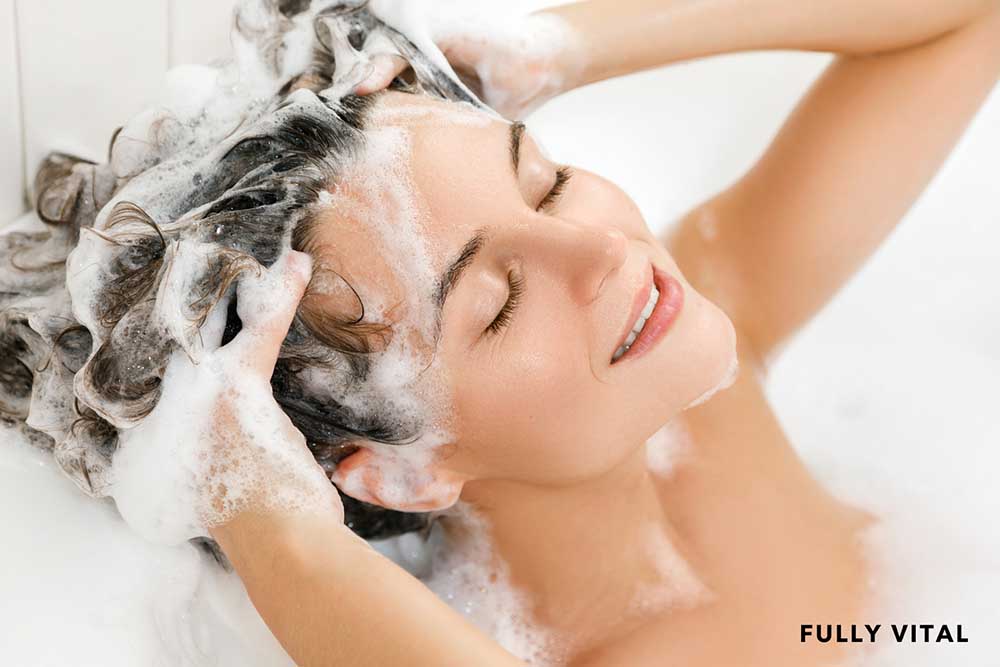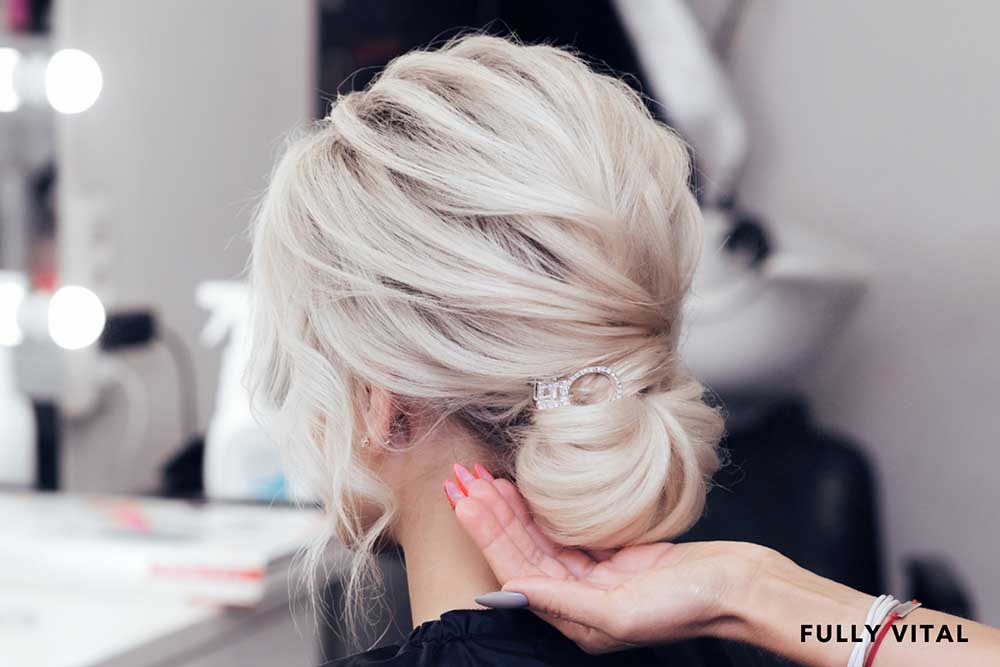
Shampoo For Oily Hair: Your Ultimate Solution For Greasy Hair Woes
If you're tired of dealing with greasy hair that seems to get oily just hours after washing, it's time to turn to the power of shampoo for oily hair.
This specialized hair care product is designed to combat excess oil production, leaving your locks clean, fresh, and voluminous.
In this article, we'll explore the importance of shampoo for oily hair, its benefits, alternatives, and historical usage, and answer frequently asked questions to provide you with a comprehensive guide to combat oily hair.

I LOVE MY HAIR NOW
FullyVital hair serum and hair vitamins made tremendous improvements in my hair. I truly love my hair now.
Dorit S.,
What Is Shampoo For Oily Hair?
Shampoo for oily hair is a specially formulated product designed to target and address excessive sebum production, which is often the root cause of greasy hair.
Unlike regular shampoos, which may not effectively remove the excess oil, these shampoos contain specific ingredients that help control oiliness and maintain a balanced scalp environment.(1)

Why Is Shampoo For Oily Hair Important?
Using shampoo for oily hair is crucial for individuals with greasy hair. Excess oil production can lead to a range of issues, including limp, flat hair, clogged hair follicles, and an increased risk of dandruff.
By incorporating a shampoo specifically tailored for oily hair into your hair care routine, you can effectively cleanse your scalp, control oiliness, and promote healthier, voluminous locks.
What Is the Historical Usage of Shampoo for Oily Hair?
The history of shampoo for oily hair dates back centuries. Ancient civilizations used various natural substances to cleanse their hair, including plant extracts and herbs.
In ancient Egypt, for example, a mixture of animal and plant oils was used to remove dirt and excess sebum from the hair and scalp.
Throughout history, different cultures have employed ingredients like soapwort, neem, and amla to maintain scalp hygiene and control oiliness.
Today, advancements in science and technology have led to the development of specialized shampoos tailored to address specific hair concerns, including oily hair.
These modern shampoos combine the wisdom of historical practices with scientific research to create effective solutions for managing oily hair in the present day.
What Are The Benefits Of Shampoo For Oily Hair?
Oil Control
These shampoos are formulated with ingredients that help regulate sebum production, ensuring your hair stays fresher for longer.
By balancing oil levels, they prevent your hair from looking weighed down and greasy, giving you a cleaner and more manageable style.
Cleansing And Refreshing
Shampoo for oily hair thoroughly cleanses the scalp, removing dirt, excess oil, and product buildup.
It leaves your hair feeling rejuvenated and revitalized.
The deep cleansing action helps unclog hair follicles, allowing for healthier hair growth and reducing the risk of scalp issues such as dandruff.
Adds Volume
By eliminating excess oil, these shampoos can add volume and lift to your hair, creating a fuller and more voluminous appearance.
Greasy hair often looks flat and lacks body, but with a shampoo designed for oily hair, you can achieve a bouncy and voluminous style that lasts throughout the day.
Promotes Scalp Health
A balanced scalp environment is vital for healthy hair growth.
Shampoo for oily hair helps maintain a healthy scalp by reducing oiliness and preventing clogged hair follicles.
By keeping your scalp clean and free from excess sebum, you create an optimal environment for new hair to grow and thrive.
How Can I Naturally Reduce Oily Scalp?
If you prefer natural remedies to combat an oily scalp, there are several methods you can try:
Apple Cider Vinegar Rinse
Mix equal parts of apple cider vinegar and water and use it as a final rinse after shampooing.
Apple cider vinegar helps balance the pH level of the scalp, reducing oiliness.
Lemon Juice
Apply fresh lemon juice directly to your scalp, let it sit for a few minutes, and rinse thoroughly.
The acidity of lemon juice helps control oil production and leaves your scalp feeling refreshed.
Aloe Vera
Apply aloe vera gel directly to your scalp, leave it on for 15-20 minutes, and then rinse.
Aloe vera has soothing and balancing properties that can help reduce excess oiliness.
Tea Tree Oil
Mix a few drops of tea tree oil with your shampoo and wash your hair as usual.
Tea tree oil has antibacterial properties that can help control oil production and prevent scalp issues.
Remember, natural remedies may work differently for individuals, so it's important to find the method that suits your scalp and hair type.
How Often Should You Wash Your Oily Hair?
The frequency of washing oily hair depends on various factors, including your scalp's oil production and your lifestyle.
Generally, it is recommended to wash oily hair every 1-2 days. Frequent washing helps remove excess oil and keeps your hair looking fresh.
However, be mindful not to overwash, as this can strip away the natural oils your scalp needs, leading to an overproduction of sebum.
Pay attention to how your hair feels and adjust the frequency accordingly.(2)
How Do You Properly Shampoo Oily Hair?
Properly shampooing your hair is crucial for maintaining a healthy scalp and managing oiliness. Follow these steps for effective shampooing:
-
Wet Your Hair
Thoroughly wet your hair with lukewarm water before applying shampoo.
Avoid using hot water, as it can stimulate oil production.
-
Apply Shampoo
Take a small amount of shampoo, lather it between your palms, and apply it to your scalp.
Focus on massaging the shampoo into your scalp using gentle circular motions. This helps remove dirt, excess oil, and product buildup.
-
Rinse Well
Rinse your hair thoroughly to ensure all the shampoo is washed out.
Leaving residue can weigh down your hair and contribute to oiliness.
-
Condition Appropriately
If you choose to use a conditioner, apply it only to the ends of your hair, avoiding the scalp.
This prevents adding excess moisture to your roots, which can lead to greasiness.
-
Rinse with Cold Water
Finish your shower routine by rinsing your hair with cold water.
Cold water helps close the hair cuticles, resulting in smoother, shinier hair and reduced oiliness.
What Are Some Things To Keep In Mind When Choosing A Shampoo For Oily Hair?
Choosing the right shampoo for oily hair is essential to effectively manage excess oil and maintain a fresh, balanced scalp.
Here are some important factors to consider when selecting a shampoo for oily hair:
Oil-Control Ingredients
Opt for shampoos that contain oil-controlling ingredients such as tea tree oil, salicylic acid, or witch hazel.
These ingredients help regulate sebum production and keep the scalp balanced.
Lightweight And Volumizing Formulas
Choose lightweight shampoos that won't weigh down your hair or leave a residue.
Look for volumizing formulas that add body and lift to your hair, giving it a fresh, fuller appearance.
Avoid Heavy Conditioning Ingredients
Oily hair typically doesn't require heavy conditioning.
Avoid shampoos that contain excessive conditioning agents or oils that can contribute to greasiness.
Gentle And Ph-Balanced
Ensure that the shampoo is gentle on your scalp and has a pH-balanced formula.
Harsh shampoos can strip away natural oils, triggering more oil production, while pH-balanced formulas maintain a healthy scalp environment.
What Are Some Hair Care Products to Avoid if You Have Oily Hair?
When you have oily hair, it's essential to avoid certain hair care products that can exacerbate oiliness or weigh down your hair.
Here are some products to steer clear of:
Heavy Conditioners
Avoid using thick, heavy conditioners or those designed for dry hair.
These can make your hair greasier and weigh it down, leaving it looking flat and lifeless.
Silicone-Based Products
Hair products containing silicones can create a buildup on your scalp and hair, making it difficult for sebum to properly distribute.
Look for silicone-free products or those labeled as "lightweight" or "oil-free."(3)
Overuse of Styling Products
Excessive use of styling gels, mousses, and sprays can lead to product buildup and make your hair appear greasier.
Use these products sparingly and opt for lightweight, water-based formulas.
Occlusive Oils
Avoid using heavy, occlusive oils such as mineral oil or petrolatum on your scalp.
These can clog the hair follicles and contribute to greasiness.
By avoiding these products and opting for lightweight, oil-balancing alternatives, you can better manage oily hair and maintain a fresh, voluminous look.
What Are Alternative Shampoos for Oily Hair?
Dry Shampoo
Dry shampoo is a convenient option that absorbs excess oil without the need for water.
It's a quick and easy way to refresh your hair between washes.
Simply spray or apply the dry shampoo to your roots, massage it in, and brush out any residue for instantly revived hair.
Clarifying Shampoo
A clarifying shampoo is a deep-cleansing formula that effectively removes impurities, including excess oil and product buildup.
It's ideal for occasional use to detoxify your hair.
Using a clarifying shampoo once a week or every other week can help remove stubborn buildup and restore your hair's natural shine.
Natural Remedies
Some natural ingredients, such as lemon juice or apple cider vinegar, can help combat oiliness.
These can be used as rinses or added to homemade hair treatments.
For example, mixing diluted apple cider vinegar with water and using it as a final rinse after shampooing can help balance your scalp's pH levels and reduce oil production.
Ready to transform your hair? Introducing Fully Vital's Powerful Vegan Hair Regrowth System for Women:
- Stimulates hair follicles in 4 different ways for optimal growth
- Just 2 minutes per day for a convenient hair care routine
- Backed by our 120-day money-back guarantee
Experience the power of our Vegan Hair Regrowth System and unlock the potential of your hair.
Say goodbye to thinning and hello to fuller, healthier locks. Try Fully Vital risk-free today!
Final Thoughts
Managing oily hair requires the right shampoo and hair care routine.
By choosing a clarifying shampoo designed for oily hair, you can effectively control excess oil and maintain a fresh scalp.
At Fully Vital, we offer a Powerful Vegan Hair Regrowth System for Women that stimulates hair follicles in four ways, taking just two minutes per day.
Experience the effectiveness of our product and take control of your hair journey today.
With our 120-day money-back guarantee, you have nothing to lose. Embrace healthier, more vibrant hair with Fully Vital.
Frequently Asked Questions About Shampoo For Oily Hair (FAQ)
Can using shampoo for oily hair make my hair dry?
While shampoo for oily hair is designed to control oiliness, it's essential to choose a product that strikes a balance.
Look for shampoos that are formulated to remove excess oil without stripping away the natural moisture of your hair.
Can I use conditioner after using shampoo for oily hair?
using a lightweight conditioner or a conditioner specifically formulated for oily hair is recommended.
Focus on applying the conditioner to the ends of your hair to avoid weighing down the roots and exacerbating oiliness.
Can shampoo for oily hair help with hair loss or greying hair?
Shampoo for oily hair primarily targets excess oil production and scalp hygiene.
While it can help promote a healthier scalp environment, it's not specifically formulated for hair regrowth or reversing greying hair.
For addressing these concerns, you may consider exploring products specifically designed for hair regrowth and combating greying hair.
What are some tips for styling oily hair?
Styling oily hair can be a bit challenging, but with the right techniques, you can still achieve fabulous looks.
Here are some tips to help you style your oily hair:
Dry Shampoo
Dry shampoo is your best friend when it comes to oily hair. It helps absorb excess oil and adds volume to your hair.
Apply it to the roots, wait for a few minutes, and then brush or massage it through your hair to refresh and revitalize your locks.
Hairstyles that Conceal Oiliness
Opt for hairstyles that can help conceal oily roots, such as updos, braids, or high ponytails.
These styles not only look chic but also keep the focus away from greasy roots.
Texturizing Products
Use texturizing sprays or powders to add texture and grip to your hair.
These products create the illusion of thicker, fuller hair and make styling easier.
What are some common myths about oily hair?
When it comes to oily hair, there are many myths and misconceptions that can lead to confusion.
Let's debunk some of the most common myths about oily hair:
Oily hair is caused by poor hygiene
Oily hair is primarily caused by overactive sebaceous glands, not poor hygiene.
Washing your hair too frequently can actually strip away natural oils, leading to increased oil production.
Oily hair can be cured by not washing it
While reducing the frequency of washing can help balance oil production, completely avoiding washing is not the solution.
Regular cleansing with the right products is essential to maintain a healthy scalp and hair.
Brushing hair frequently reduces greasiness
Brushing your hair too often can stimulate the production of more oil, making your hair appear greasier.
Use a wide-toothed comb instead to gently detangle your hair.
SOURCES:
- We Tested Shampoos for Oily Hair and These 8 Will Give You That Clean Scalp Feeling. (n.d.). Byrdie. Retrieved June 9, 2023, from https://www.byrdie.com/shampoos-for-oily-hair-4163478
- How often to wash hair: Factors and tips. (2021, September 24). Www.medicalnewstoday.com. https://www.medicalnewstoday.com/articles/how-often-to-wash-hair#:~:text=How%20often%20should%20a%20person%20wash%20their%20hair%3F&text=People%20with%20oily%20hair%20or
- 25 Ways to Fix Oily Hair. (2021, February 3). Healthline. https://www.healthline.com/health/oily-hair-remedy#8.-Deep-clean-with-aloe







